Cry, the Beloved Country
Some fragmented thoughts on my encounter with violence in South Africa, the beauty and the sorrow of a gorgeous land, a garden's grace, and a home-cooked meal
Thursday, August 10
Grand Rapids, Mich.
This time last week, my nephew Caleb and I were packing up his stuff and marking the end of a wonderful trip together to Botswana and South Africa.
Everything went nearly perfectly until Caleb’s final afternoon in South Africa. We were driving to Cape Town airport when we hit a traffic jam. What we didn’t know—and what wasn’t yet being reported on the radio, because it had just kicked off—was that the city’s taxi union had unexpectedly called a strike, and taxis were strategically congesting the motorways. As the roads descended quickly into logjam, some opportunists took advantage.
Two miles from the airport, we drew to an unexpected halt behind a couple of buses. Suddenly, I heard shattering glass. I turned to see a large rock amid the shards on the rental car’s back seat and a teenage boy sprinting away with my backpack. Knowing that the backpack contained, among other things, my passport, I spun the car onto the shoulder. A second rock came hurtling through the driver’s-side window. It destroyed the glass and hit my arm. (That kid had a strong arm, superb aim, and remarkable speed; in another time and place, he could have had a bright future in baseball.)
As soon as I got out of the car to try to figure out what exactly was happening, other motorists waved me down and shouted at me: Get back in. Another driver flagged down some police officers. They stopped and told us that this part of town was too dangerous even for them; later, whenever folks asked where we were when we were attacked, and I said, “By the Borcherds Quarry exit on the N2,” I inevitably got some combination of a knowing glance, a shake of the head, a story about their ordeals at that same exit, and a statement along the lines of, “Everyone knows never to stop there.” After instructing us to follow them, the police turned their lights and sirens on, wove through the traffic, and escorted us to the airport.
As soon as I exited the car at the airport, I—to use the clinical terminology—lost my shit. In that one rental-car-return line alone, four other cars had also been attacked. One woman was much bloodier than I was.
“You’re safe now,” one of the rental-car attendants said. Disbelief and grief, sadness and shock, anger and frustration, fear and trembling: They all hit me at once. This is how my trip with Caleb was ending? Is this what he’d remember? How would I get home? A bit of gratitude too: Caleb was physically uninjured, he still had his passport, and he did make his flight home.
Over the past week, the violence has worsened. Five people have now been killed, including a young person who is believed to have been stoning cars on that same section of motorway where we were attacked. An armed driver shot him as well as three other boys, who were injured but survived. A British tourist who took a wrong turn coming out of the airport was also murdered.
In the days since, I’ve thought constantly of those who have been affected by the violence, including the commuters who are just trying to make a living but can’t get to work, the residents of those neighborhoods, and the protesters who are unleashing their pent-up anger. The boy who took my backpack has come to mind more often than I expected. I don’t know what he might get for the camera that was in my backpack, but a new one costs about $1,000. A 2016 socioeconomic study of Lusaka, the settlement next to that road, found that 90% of households there subsist on less than $180 a month; 16% reported no income at all.
It’s a young neighborhood: 75% of Lusaka residents are under the age of 40. More than half of its adults—and two-thirds of working-age residents under 30—are unemployed. Homes lack running water; the entire neighborhood shares five taps. In all of Lusaka, which houses more than 2,000 people, there are just 22 toilets, which, by the South African government’s definition, includes not just flush toilets but also pit latrines. Most residents reported using buckets.
During our trip, Caleb and I had a couple of conversations about the reality of life in southern Africa, including the very evident socioeconomic inequality. As part of our visit to Camp Kalahari in Botswana, for instance, we got to meet members of the Ju/’hoansi tribe. They taught us a few things about interpreting the landscape and spoke candidly about their alienation from broader Botswanan society. When I asked a man named Xhamme whether he thinks of himself as Botswanan, he laughed. “They have a good life,” he said, “and we do not have a good life. Our life is very difficult compared to Botswanan people.”
In South Africa, the gulf between poor and rich is obvious even on the short drive from the Cape Town airport into the city center. You pass the townships, with their tightly packed, higgledy-piggledy shacks, and then, a few minutes later, just after rounding Table Mountain, you glimpse gated villas and gorgeous vistas. As we drove, Caleb and I discussed corruption and poverty, the legacy of history and the persistent divisions in society.
Of course, we spent nearly all of our time on the prettier side of that divide, in the lovely, relatively safe, and incredibly photogenic South Africa, gawking at wild penguins and hiking not because we had to get to work but just for fun. On our last evening, Caleb and I dined at the Chef’s Warehouse at the Bailey, where we feasted like princes on tuna tartare, house-made pappardelle with plump prawns, and sticky pork belly with kimchi. Our delicious meal cost about 1,000 South African rand—a little over $50; nearly half of households in Lusaka don’t make that much in a month.
This is the messy complexity we encounter when we travel, if only we allow ourselves to see. As a journalist, I’ve sought to convey some of these contradictions in my writing. As a traveler, I can reduce a place to a locus for my consumption or I can encounter it with holistic attention and care. Though my dollar can probably afford me the glossy travel-brochure version of most places and though I absolutely understand that vision’s appeal, I don’t wish to be a thoughtless traveler who buys his way into happy ignorance. That is its own, self-interested form of toxic positivity. Can we see the world as it is, not merely as we wish it to be?
Both the strike and the ensuing violence have their roots in deep frustration and longstanding anger at a government that has not served its people equally. For all the U.S. government’s faults, I enjoy the benefits of a system that mostly attends to my needs. Shortly after the attack, I contacted my congresswoman’s office. Within hours, Rep. Hillary Scholten’s staff was in touch with diplomatic officials in South Africa. The next morning, I was woken by a call from a sympathetic consular officer. By Monday morning, I had a new, surprisingly purple passport in hand.
What anger I felt in the immediate aftermath of the incident has melted away as I’ve pondered the reality of the boy’s circumstances. I can still see his face in my mind. I’m glad for that. The memory of those big, searching eyes helps me to hold onto the truth that he is human—wonderfully human, painfully human, human in his utter belovedness as well as his flawed reality. What was he thinking? I can’t know. But my wish and my prayer for that kid is for grace and good fortune. What have I done, such that I’ve enjoyed these things and he hasn’t? It’s luck that I’ve had so much opportunity and he has not.
What sadness I felt has been assuaged, too, by the deep kindness and the lavish hospitality of the South Africans I encountered in the hours and days afterward.
An airport worker who saw me bloodied and confused insisted on walking Caleb and me to the airport police post. She had just finished her shift and wasn’t sure how she was going to get home, but no matter: She had time, she knew where we needed to go, and she wanted to make sure we got there.
Despite my protests that I was fine, Officer Le Roux at the police station insisted on not only taking the requisite report but also wiping the blood from my face with a wet cloth. “I can’t let you leave looking like this,” she said, as she gently worked her way around the cuts. “There you go. Much better.”
My Ph.D. adviser at Stellenbosch University, Robert Vosloo, did all he could to distract me, taking me for wine tastings and meals and reminding me of the stunning welcome that his homeland can offer. One evening, one of his neighbors welcomed us for dinner. It was a gathering of his monthly wine club, and he insisted there was plenty of space around the table and more than enough food and drink for all. The pours were overly generous, the steak from the braai outstanding.
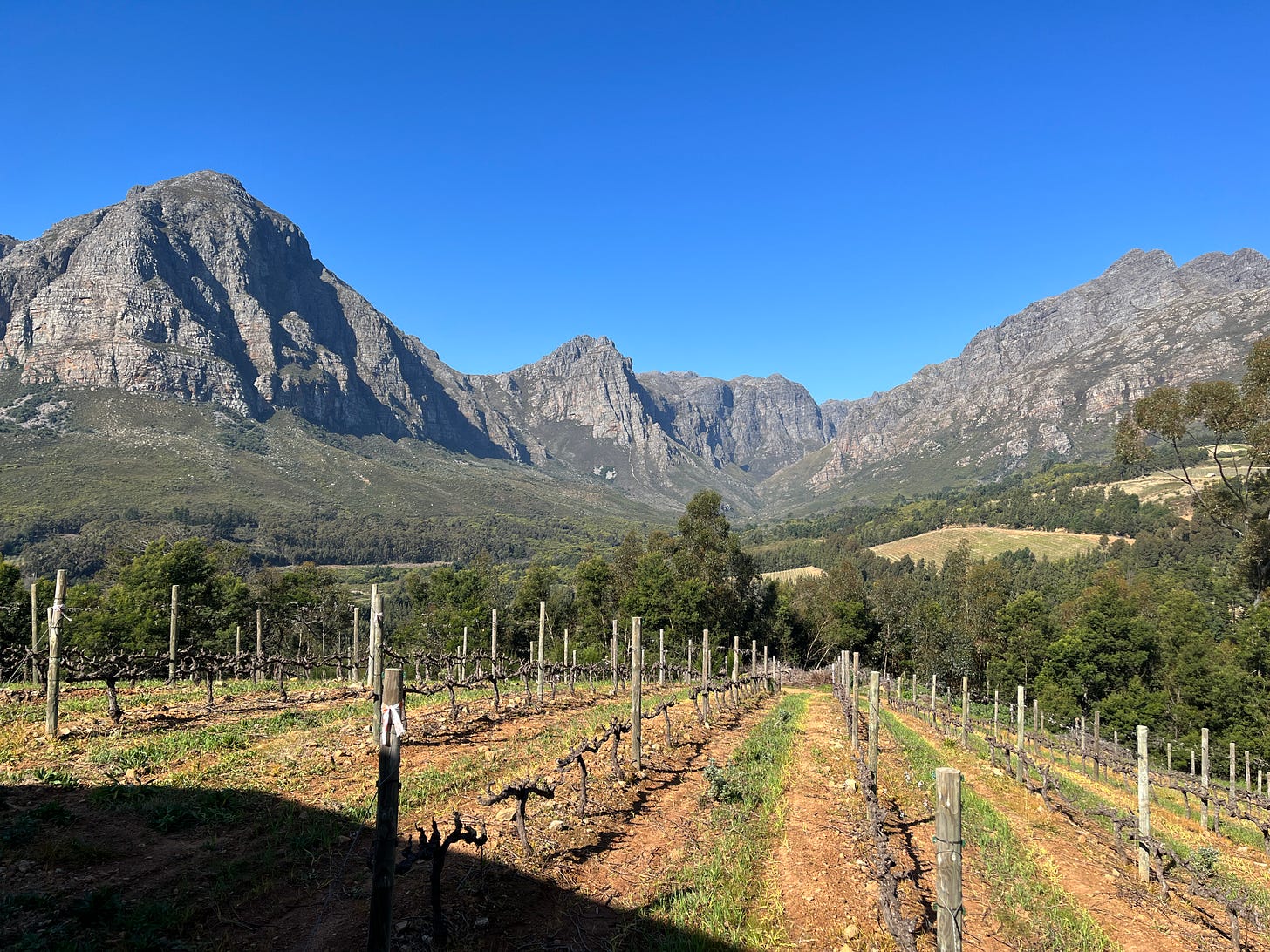
When I checked in for my flight home, the woman at the airline counter looked at my emergency passport with curiosity. I explained what had happened. “I hope you’ll still come back to our country,” she said with a sad look. “Of course I will. It’s a beautiful country, and I love it,” I replied.
I meant that with all my heart: South Africa abounds in beauty. I’ve seen it and I’ve tasted it and I’ve felt its embrace. And my wish and my prayer for that beloved country—indeed, for this whole aching world—is for flourishing and equity, justice and peace, goodness and healing.
How do we make wishes come true and find answers to those prayers? On a societal and global scale, I don’t know. It can all feel so overwhelming. On a personal level, though, I believe we just have to keep doggedly seeking the welfare of our neighbor, even those who, for whatever reason, might not be seeking the same for us. What other option do we have? What other hopeful way forward is there but love?
What I’m Eating: Travel can be so disorienting, even at the best of times. One thing I do when I’m in a place for more than a day and a night is to create the tiniest rhythms of routine. That steadies me. In Cape Town, where we spent three nights, I went every morning for coffee at Deluxe Coffeeworks, around the corner from our hotel. The barista, Maxime, who makes an excellent cortado, told me that he moved to South Africa from the Democratic Republic of the Congo; he hasn’t seen his mom since before the pandemic, and he’s hoping to visit home soon. By the third morning, Max was starting my coffee as soon as he glimpsed me outside the cafe window. On the street right outside, Warida Cornelius has been selling samosas and other goodies for twenty years. She’s part of the Cape Malay community, who trace their ancestry to Southeast Asian Muslims, some enslaved, some free, who were brought (or came) to what’s now South Africa in the 17th and 18th centuries. Those samosas? They’re excellent. What she offers depends on the day and her mood. I enjoyed the samosas filled with fragrantly spiced chicken and deeply savory beef, but my favorite were the potato ones, because carb + carb = transcendent yumminess for breakfast.
What I’m Growing: I returned to a garden plot overrun by weeds. The field bindweed is out of control! But we’ve got a wealth of tomatoes, the beans seem to be doing well despite the enduring presence of bean beetles, and the flowers look gorgeous. The gladioli, which we did not plant, continue to surprise us with their grace.
What I’m Cooking: For my first dinner home, I wanted to cook something special. As much as I enjoy restaurants when I travel, I do miss cooking. We had a pork tenderloin in the freezer, and all the garden’s bounty. Yesterday, Fozz and I cut some chard, dug some purple potatoes, and brought home so many tomatoes. I slow-roasted the tomatoes at 275°F for about an hour and a half, though two hours might have been better. Then I seared the pork in a cast-iron pan, then wrapped it in foil with plenty of butter and herbs—basil, thyme, carrot tops, and garlic yesterday, but you can really use whatever you like—and finished it in the oven (400°F until the meat registers 145°F on an instant thermometer, which usually takes no more than 20 minutes). I also roasted the potatoes with just some olive oil and plenty of salt and pepper (parboil them first, and then bash them around in the pan, which helps make for crispy edges). And I sautéed the chard with garlic.
It doesn’t often happen, but when I look at the plate and realize that all the vegetables and herbs came from either our yard or our garden plot, it’s a really tremendous feeling. Somehow, everything tastes a little better.
I’m still recovering from the events of the past week as well as from the long journey home—33 hours from the time my flight left Cape Town until I walked through the door of my house. So that’s all I’ve got for this week. As always, I’m so grateful that we can stumble through all this together, and I’ll try to write again soon. In the meantime, what’s going on in your corner of the world? What can I be remembering in my prayers?
With gratitude and in hope,
Jeff




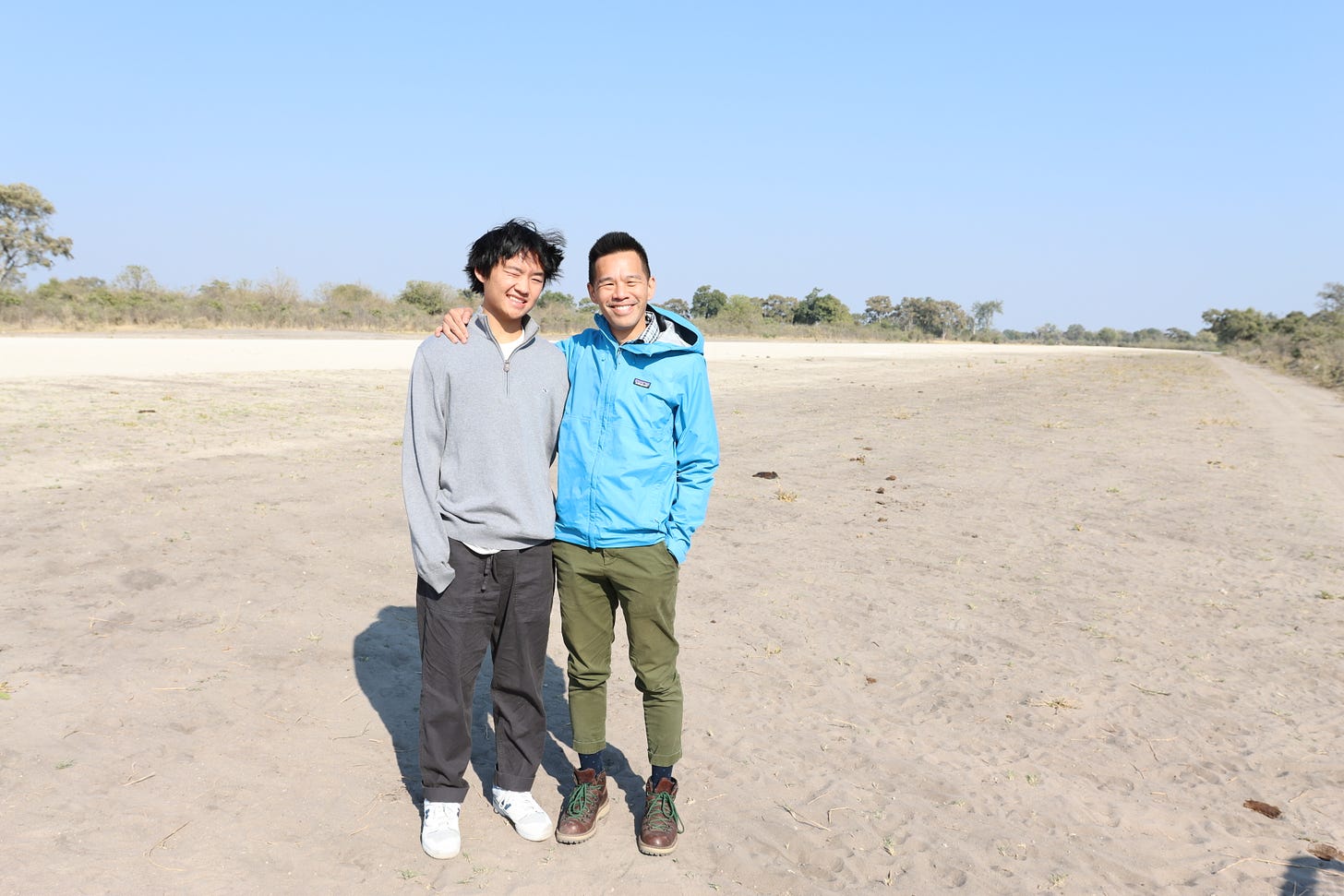

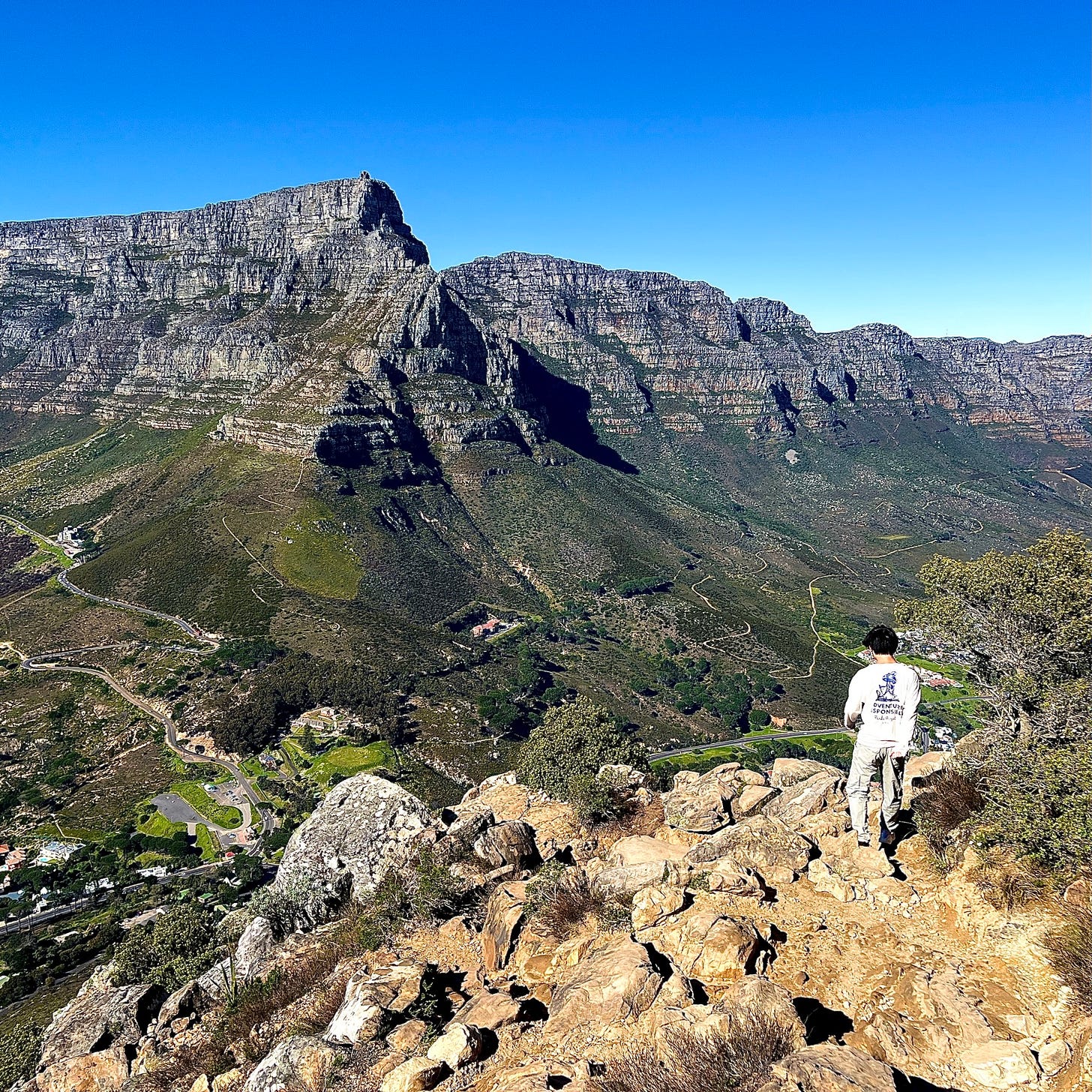
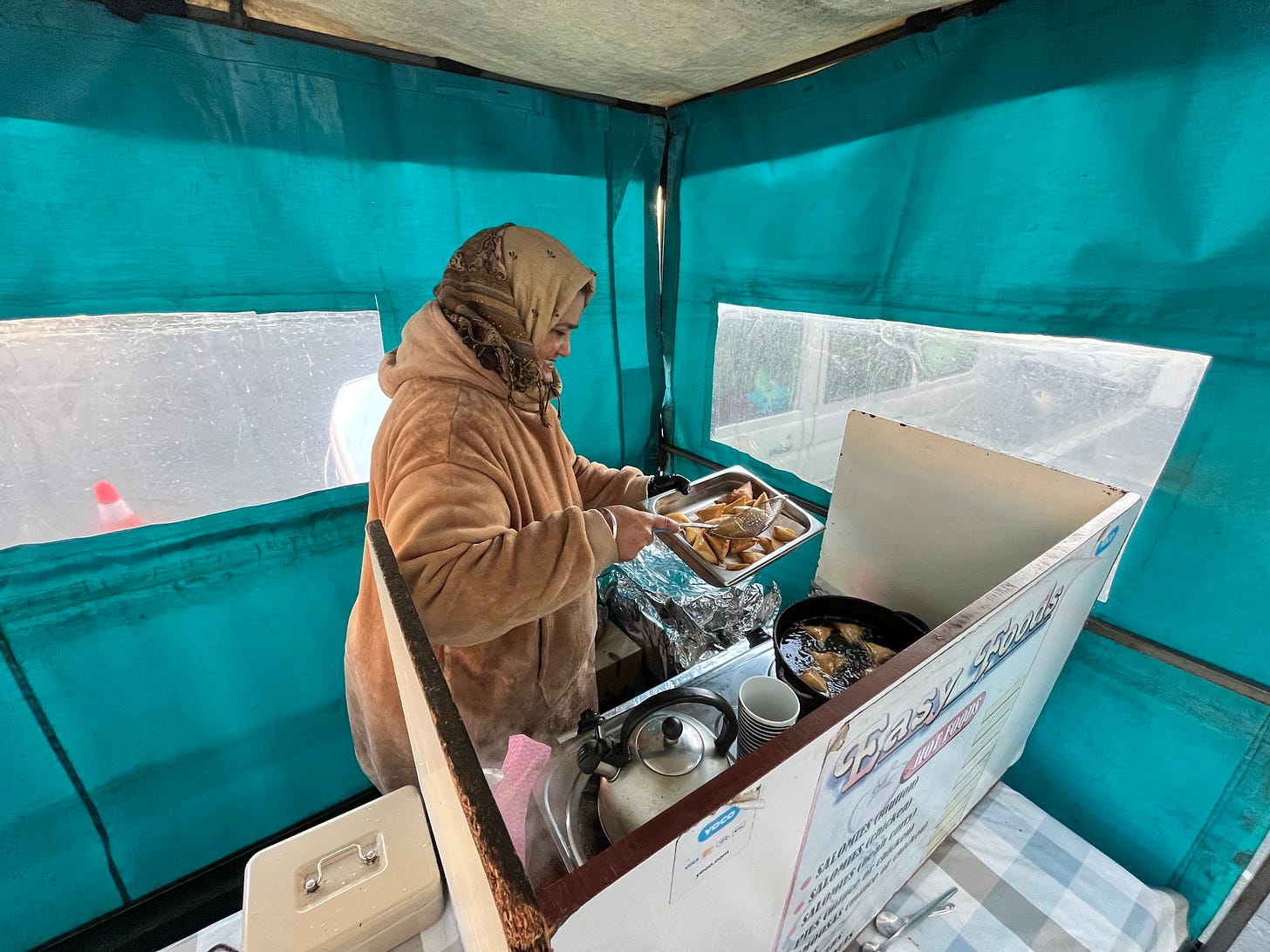
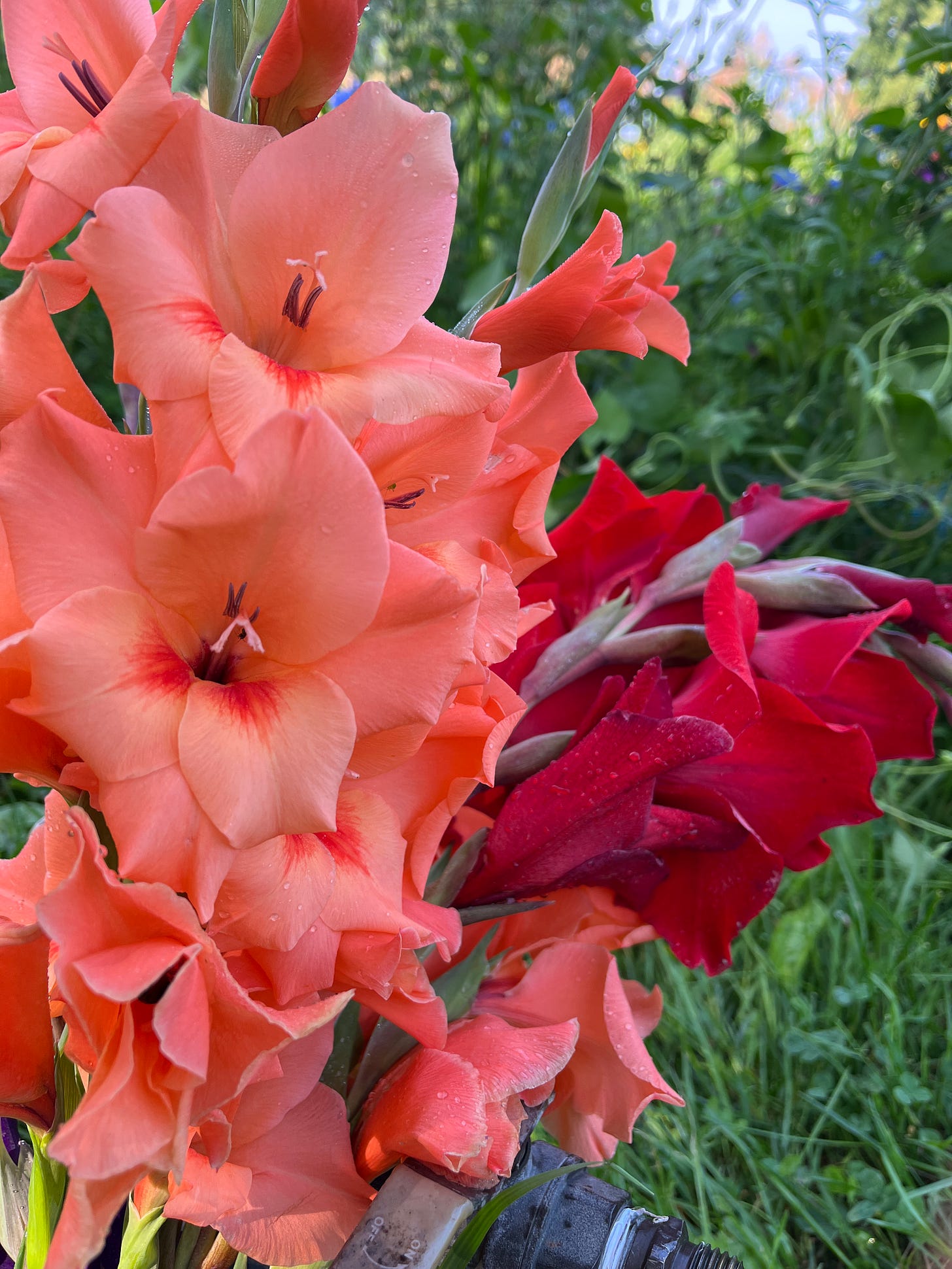
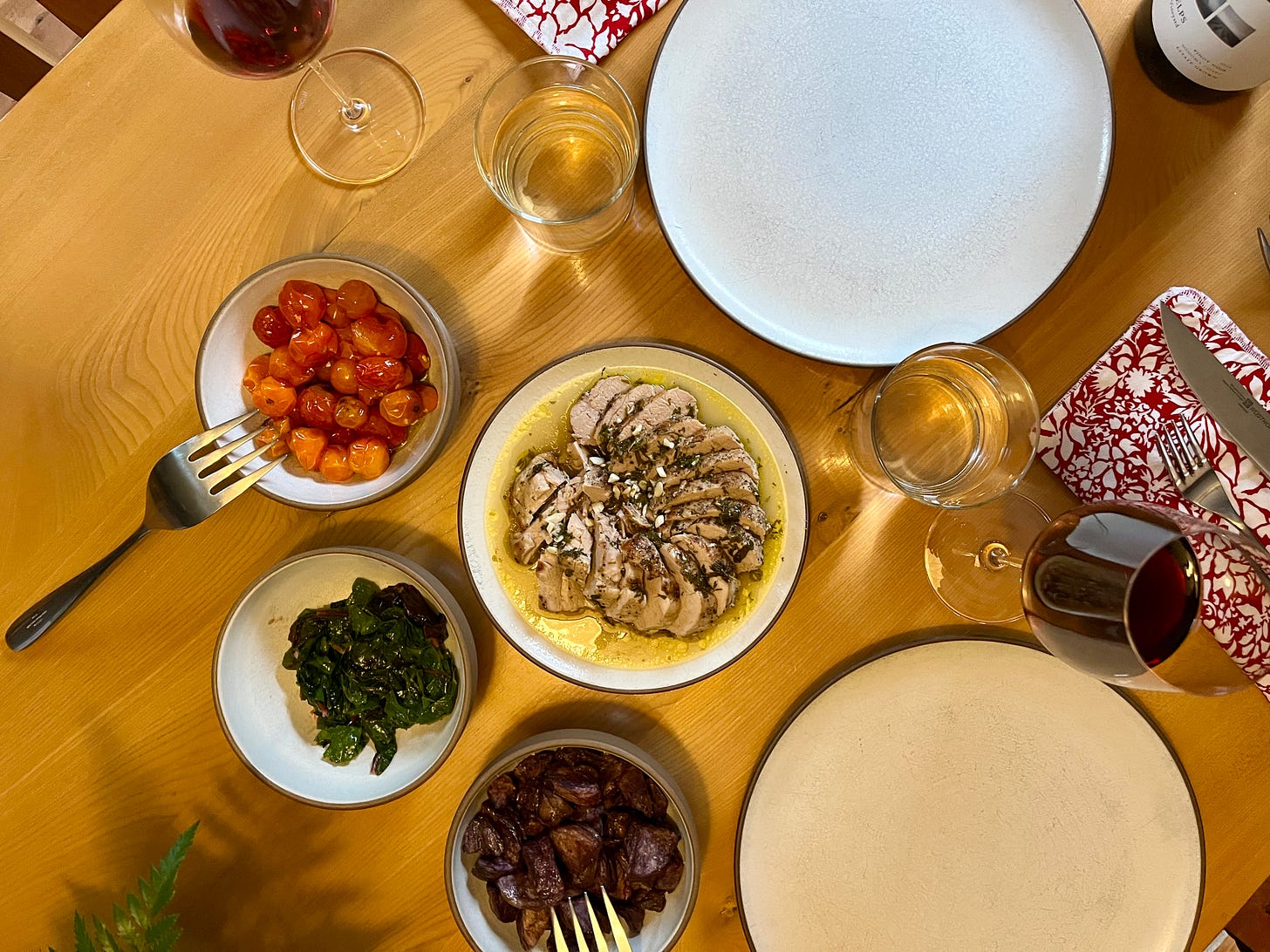
You owed us nothing, but I’m thankful for your thoughtful essay on how you are processing this traumatic experience. You again teach me the both/and of life, and I wonder, is that a discipline you’ve learned or a natural way of viewing the world? Either way, I learn from you, so thank you for your vulnerable sharing. And welcome home! I love that the garden greeted you with its bounty which I am sure was in its own way healing.
Jeff, thank you for this beautiful reminder: "I believe we just have to keep doggedly seeking the welfare of our neighbor, even those who, for whatever reason, might not be seeking the same for us. What other option do we have? What other hopeful way forward is there but love?" Maybe that is why this is the most important rule - because it can also be very hard, maybe almost impossible, to do at times. Glad you and Caleb returned safely home and hope/pray for no long-term impacts from the attack on your car rental and self🙏